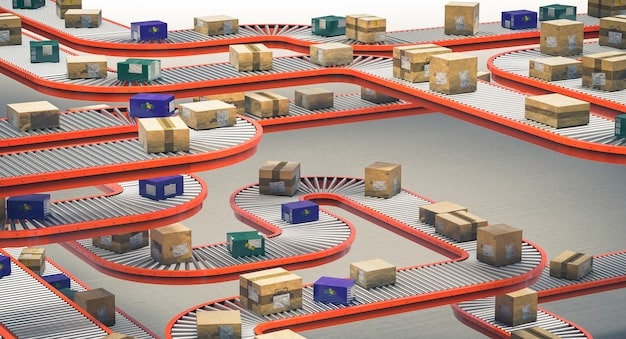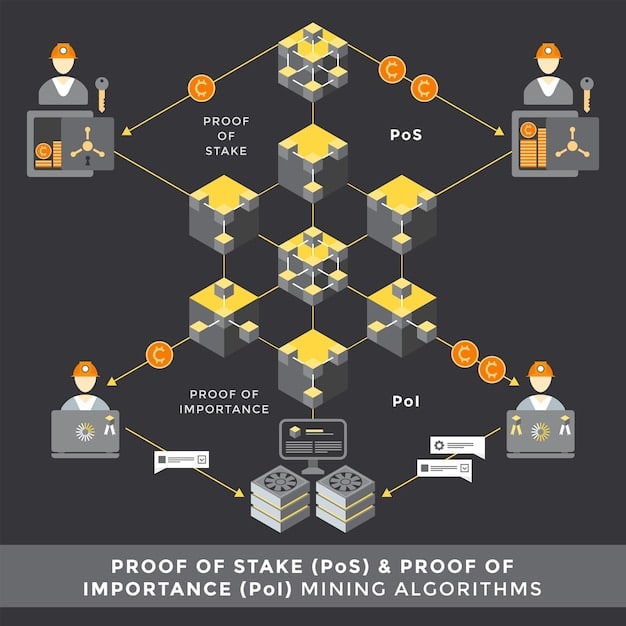Blockchain in Supply Chain Management: Tracking Products in the US

Blockchain in Supply Chain Management: Tracking Products from Origin to Consumer in the US offers enhanced transparency, security, and efficiency, transforming how businesses manage their supply chains by providing real-time tracking and verification of goods across various stages.
In today’s complex global market, ensuring transparency and efficiency in supply chain management is crucial. Blockchain in Supply Chain Management: Tracking Products from Origin to Consumer in the US provides a revolutionary solution, offering unprecedented visibility and security.
Understanding Blockchain’s Role in Supply Chain Visibility
Blockchain technology is rapidly changing various industries, and its application in supply chain management is particularly transformative. By leveraging blockchain, companies can achieve end-to-end visibility, improving operational efficiency and building stronger trust with consumers.
Enhanced Transparency
One of the primary benefits of blockchain is its ability to create a transparent and immutable record of transactions. This means every step in the supply chain, from the origin of raw materials to the delivery of the final product, can be tracked and verified.
Improved Security
Blockchain’s decentralized nature makes it highly secure. Each transaction is encrypted and added to a distributed ledger, making it virtually impossible for unauthorized parties to tamper with the data. This is especially important in preventing counterfeit goods from entering the supply chain.

Here are key advantages of using blockchain for supply chain visibility:
- Real-time Tracking: Provides instant updates on the location and status of goods.
- Immutable Records: Ensures data integrity and prevents fraud.
- Smart Contracts: Automates processes and reduces manual intervention.
- Better Compliance: Simplifies regulatory reporting and audits.
In summary, blockchain technology enhances supply chain visibility by offering secure, transparent, and efficient tracking of products from origin to consumer. This not only improves operational efficiency but also builds trust and reduces the risk of fraud.
The Benefits of Blockchain in US Supply Chains
Implementing blockchain in US supply chains brings a multitude of benefits that address many of the current challenges in logistics and product tracking. From reducing costs to enhancing security, the advantages are significant.
Cost Reduction
By automating processes and reducing the need for intermediaries, blockchain can significantly lower operational costs. Smart contracts, for example, can automate payments and verifications, eliminating the need for manual processing.
Enhanced Security
The immutable nature of blockchain ensures that data cannot be altered, providing a secure record of all transactions. This is particularly valuable in preventing fraud and counterfeit goods from entering the supply chain.
Here’s how blockchain benefits US supply chains:
- Reduced Fraud: Minimizes the risk of counterfeit goods and unauthorized transactions.
- Improved Efficiency: Streamlines processes and reduces delays.
- Increased Trust: Builds confidence among stakeholders through transparent tracking.
- Better Compliance: Simplifies regulatory reporting and audits.
Case Study: Walmart
Walmart is a pioneer in using blockchain to track food products. By implementing blockchain, they can trace the origin of mangoes in seconds, compared to weeks using traditional methods. This rapid tracing helps them quickly identify and isolate contaminated products, preventing widespread recalls.
Overall, the benefits of blockchain in US supply chains are vast, ranging from cost reduction and enhanced security to improved efficiency and greater trust among stakeholders. These advantages make blockchain a valuable tool for modernizing supply chain management.
Implementing Blockchain for Product Tracking
Implementing blockchain for product tracking involves several key steps, from selecting the right platform to integrating it with existing systems. A well-planned implementation is essential for realizing the full benefits of blockchain technology.
Choosing the Right Blockchain Platform
There are several blockchain platforms available, each with its own strengths and weaknesses. Companies need to evaluate their specific needs and choose a platform that aligns with their requirements. Popular platforms include Ethereum, Hyperledger Fabric, and Corda.
Integrating with Existing Systems
Integrating blockchain with existing Enterprise Resource Planning (ERP) and supply chain management systems is crucial for seamless operation. This integration allows data to flow seamlessly between the blockchain and other business applications.

Key steps for implementing blockchain for product tracking:
- Define Objectives: Clearly outline the goals and objectives of the blockchain implementation.
- Choose a Platform: Select a blockchain platform that meets your specific needs.
- Integrate Systems: Integrate the blockchain with existing ERP and supply chain systems.
- Set Up Smart Contracts: Develop and deploy smart contracts to automate processes.
Best Practices
Following best practices is essential for a successful blockchain implementation. This includes ensuring data accuracy, providing adequate training for staff, and maintaining compliance with regulatory requirements.
In conclusion, implementing blockchain for product tracking requires careful planning and execution. By choosing the right platform, integrating with existing systems, and following best practices, companies can effectively leverage blockchain to improve supply chain visibility and efficiency.
Challenges and Solutions in Blockchain Adoption
While blockchain offers significant advantages, adopting it in supply chain management also presents several challenges. Understanding these challenges and identifying solutions is crucial for successful implementation.
Scalability Issues
One of the main challenges is scalability. As the volume of transactions increases, some blockchain networks can become slow and inefficient. Solutions include using more scalable blockchain platforms and implementing layer-2 scaling solutions.
Lack of Standardization
The lack of standardization in blockchain technology can also be a barrier to adoption. Different blockchain platforms use different protocols and standards, making it difficult to integrate systems. Industry-wide standardization efforts are needed to address this issue.
Data Privacy Concerns
Ensuring data privacy is another significant challenge. While blockchain provides transparency, it’s essential to protect sensitive information. Solutions include using permissioned blockchains, implementing data encryption, and adhering to data privacy regulations like GDPR.
Here are some common challenges and solutions in blockchain adoption:
- Scalability: Use scalable platforms or layer-2 solutions.
- Standardization: Support industry-wide standardization efforts.
- Data Privacy: Implement data encryption and permissioned blockchains.
- Integration Complexity: Use middleware and APIs for easier integration.
In summary, adopting blockchain in supply chain management involves overcoming challenges related to scalability, standardization, and data privacy. By addressing these challenges with appropriate solutions, companies can effectively leverage blockchain to improve their supply chains.
Real-World Applications of Blockchain in Supply Chain
Several companies have successfully implemented blockchain in their supply chains, demonstrating its practical benefits. These real-world applications provide valuable insights into how blockchain can transform supply chain management.
Food Industry
As mentioned earlier, Walmart uses blockchain to track food products, reducing the time it takes to trace the origin of mangoes. This application not only enhances food safety but also improves supply chain efficiency.
Pharmaceutical Industry
The pharmaceutical industry is using blockchain to combat counterfeit drugs. By tracking drugs from manufacturer to distributor, blockchain can ensure the authenticity and safety of medications.
Examples of real-world blockchain applications:
- Walmart: Tracks food products to enhance safety and efficiency.
- IBM Food Trust: Connects growers, distributors, and retailers to improve food traceability.
- Maersk: Uses blockchain to streamline shipping and logistics processes.
- Merck: Tracks pharmaceuticals to combat counterfeit drugs.
Fashion Industry
The fashion industry is also exploring blockchain to ensure ethical sourcing and transparency. Brands are using blockchain to track the origin of raw materials and verify that their products are made under fair labor conditions.
In conclusion, real-world applications of blockchain in supply chain management are diverse and demonstrate its potential to transform various industries. From enhancing food safety and combating counterfeit drugs to promoting ethical sourcing, blockchain offers valuable solutions for modern supply chain challenges.
The Future of Blockchain in Supply Chain Management
The future of blockchain in supply chain management looks promising, with ongoing advancements and increasing adoption. As the technology matures, it’s expected to play an even more significant role in shaping the future of logistics and product tracking.
Emerging Trends
Several emerging trends are expected to drive the adoption of blockchain in supply chain management. These include the integration of blockchain with other technologies like IoT and AI, as well as the development of more scalable and user-friendly blockchain platforms.
Industry Collaboration
Increased collaboration among industry stakeholders is also expected to drive adoption. By working together, companies can develop common standards and protocols, making it easier to integrate blockchain into their supply chains.
Key trends shaping the future of blockchain in supply chain:
- IoT Integration: Combining blockchain with IoT devices for real-time tracking.
- AI Integration: Using AI to analyze blockchain data and automate processes.
- Improved Scalability: Developing more scalable blockchain platforms.
- Industry Collaboration: Creating common standards and protocols.
Looking ahead, blockchain is poised to revolutionize supply chain management, offering unprecedented transparency, security, and efficiency. As the technology continues to evolve, it will undoubtedly play a crucial role in shaping the future of global trade and logistics.
| Key Point | Brief Description |
|---|---|
| 🔒 Enhanced Security | Immutable records prevent fraud and counterfeit goods. |
| ⏱️ Real-time Tracking | Instant updates on product location and status. |
| 💰 Cost Reduction | Automation and reduced intermediaries lower operational costs. |
| 🤝 Transparency | Ensures transparent and immutable record of transactions. |
Frequently Asked Questions
▼
Blockchain is a decentralized, immutable ledger that records transactions across many computers. This technology ensures transparency, security, and efficiency in managing data.
▼
Blockchain enhances security by creating a transparent and tamper-proof record of each transaction. This prevents fraud and ensures the authenticity of products throughout the supply chain.
▼
The main benefits include improved transparency, enhanced security, reduced costs, and increased efficiency. Blockchain enables real-time tracking and verification of products from origin to consumer.
▼
Challenges include scalability issues, lack of standardization, data privacy concerns, and integration complexity. Addressing these challenges is essential for successful implementation.
▼
The future includes increased integration with IoT and AI, improved scalability, and greater industry collaboration. Blockchain is poised to revolutionize global trade and logistics.
Conclusion
In conclusion, blockchain in Supply Chain Management: Tracking Products from Origin to Consumer in the US offers a transformative solution for enhancing transparency, security, and efficiency. Despite the challenges, the benefits of adopting blockchain in supply chains are significant, paving the way for a more connected and reliable future of commerce.





